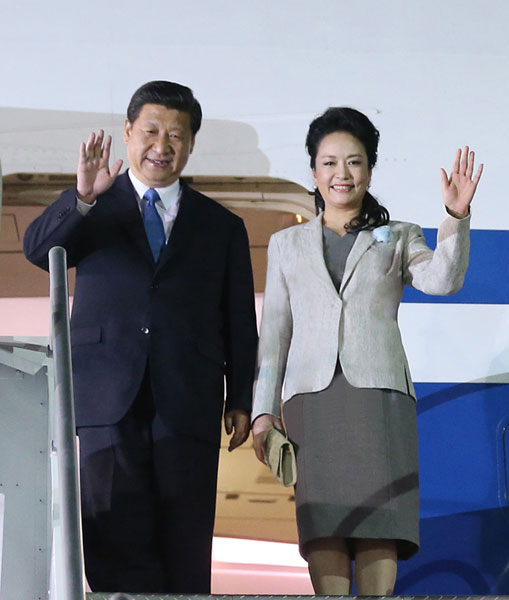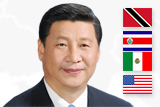Xi offers Caribbean nations support




Complementary economies can help push ties ahead, experts say
President Xi Jinping vowed continued support for the Caribbean region as he met a group of Caribbean leaders in Trinidad and Tobago.
|
 |
|
President Xi Jinping and his wife Peng Liyuan arrive at San Jose, capital of Costa Rica, on Sunday. Lan Hongguang / Xinhua |
During lunch and in separate meetings, Xi met leaders from the Bahamas, Barbados, Dominica, Granada, Guyana, Jamaica and Suriname.
He renewed China's efforts to support Caribbean nations' development by stepping up initiatives from the third China-Caribbean Trade and Economic Cooperation Forum in 2011.
 He pledged assistance in projects such as setting up one or two agricultural technology centers within the next three years, sending 100 medical workers to the region, training 100 postgraduate students and providing 1,000 scholarships for students.
He pledged assistance in projects such as setting up one or two agricultural technology centers within the next three years, sending 100 medical workers to the region, training 100 postgraduate students and providing 1,000 scholarships for students.
During the 2011 forum, China offered the Caribbean region a $6 billion loan to support development projects.
"President Xi's pledge to provide assistance in agriculture, education and healthcare represents a good step toward building a relationship based on a serious commitment to help Caribbean nations overcome their problems," said Ariel C. Armony, director for the Center for Latin American Studies at the University of Miami.
Armony said China's presence in the Caribbean through work on stadiums, resorts, hospitals and other projects should not just be viewed as simple infrastructure donated to countries that are poor in resources.
"A national stadium in the Bahamas represents a celebration of national identity and a chance for citizens to assert a sense of nationhood," Armony said. "Beijing understands well that this is a way to build a long-term relationship with countries that are eager to receive attention from the global power."
Li Changhua, former Chinese ambassador to Costa Rica, said China and the Caribbean region countries are economically complementary.
"China's products are welcomed by local people and these countries have their own competitive products to export to China," Li said.
China can assist these countries with their economic development, said Li, adding that cooperation in tourism has great potential as Caribbean countries have been popular tourist destinations.
Xi, the first Chinese president to visit Trinidad and Tobago since the countries established diplomatic ties in 1974, said he hopes these projects will help boost cooperation between China and Caribbean region nations.
Xi said China and Caribbean region nations should play to their respective advantages, continue to tap potential development opportunities and increase friendly cooperation. This will help form a good partnership with mutual respect and trust to achieve common development and prosperity, he added.
Xi began his Caribbean and Latin American visit on Friday in Port of Spain, where he met with the leaders of Trinidad and Tobago, Antigua and Barbuda on Saturday. He flew to Costa Rica on Sunday and will also visit Mexico before attending a two-day summit with US President Barack Obama in California on Friday.
Xi's Latin America visit is seen as a mission to boost economic and trade ties with the region.
"Several countries in South America have developed active commercial relations with China, but there is also a growing interest in the Caribbean, Central America and Mexico in exploring greater exchange with China and its rapidly growing market for imports," said Andrew Selee, vice-president for programs at the Wilson Center, a Washington-based think tank.
Zhu Zhiqun, a professor of political science and international relations at Bucknell University in Pennsylvania, said Xi's Caribbean and Latin American tour is a continuation of China's new diplomacy that began in the early 1990s, which also aims to promote China's soft power.
"The main aims of this new diplomacy include securing energy deals, expanding trade, investing in local infrastructure, promoting China's soft power, and projecting China as a peaceful and responsible global power," Zhu said.
Liu Zhongyi, a researcher at the Institute for World Economy Studies at Shanghai Institutes for International Studies, said resource-rich Caribbean countries, such as Trinidad and Tobago, can also help China achieve energy diversification.
"With the US becoming more energy self-sufficient, Caribbean countries need to find new markets, so China and the Caribbean countries in this area are complementary," Liu said.
Chen Weihua in Washington contributed to this story.
- Xi's visit set to give boost for regional tourism
- Xi's Mexico visit to lift bilateral relations
- Xi's visit to 'further promote' China-Mexico ties
- Xi meets with 7 Caribbean leaders
- Xi arrives in Costa Rica for state visit
- Xi pledges closer co-op with Suriname, Barbados
- President Xi visits Chinese workers in Couva
- Xi urges closer ties with Antigua and Barbuda





















